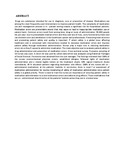| dc.contributor.author | Assanga, Phoebe A | |
| dc.date.accessioned | 2015-11-05T06:35:53Z | |
| dc.date.available | 2015-11-05T06:35:53Z | |
| dc.date.issued | 2015-09 | |
| dc.identifier.citation | Assanga, Phoebe A(2015). Evaluation of patient safety in medication administration at M.P Shah Hospital critical care unit. 1 st Global Conference on Patient Centered Care, 29 th September – 2 nd October, 2015 Kenyatta University Amphitheatre Nairobi, Kenya | en_US |
| dc.identifier.uri | http://hdl.handle.net/11295/92260 | |
| dc.description.abstract | Drugs are substances intended for use in diagnosis, cure or prevention of disease. Medications
are among the most frequently used interventions to improve patient health. The complexity of
medication use and management process in in
-
patient setting creates
a significant risk for
hospitalized patients. Medication errors are preventable events that may cause or lead to
inappropriate medication use or patient harm. Common errors result from wrong dose, drug or
route of administration. 98,000 people die per yea
r due to preventable medical errors and they
cost loss of lives, carry functional burdens and can diminish trust and satisfaction in the
healthcare system and professionals. Preventing medical errors and promoting patient safety and
quality is important. P
atient safety is a global issue affecting healthcare and is concerned with
interventions needed to decrease medication errors and improve patient safety through
medication administration. Nurses play a major role in reducing medication errors since they
fr
equently administer medication. The main objective was to evaluate patient safety in drug
administration and prevention of medication errors. Cross sectional survey. Purposive sampling
of 10 nurses was used. A check list was used to collect data which was
analyzed using Statistical
Packages of Social Sciences. Permission was obtained from the unit manager. The findings
indicated that 100% of the nurses counterchecked physician orders, established allergies,
followed rights of medication administration and e
ntered legible initials on the treatment sheets.
60% signed treatment sheets immediately. 80 % educated patients regarding medication side effects. 100% of the nurses left un
-
administered medications at the patients‘ bedside. In
conclusion, there is need f
or assessment of medication administration for routine monitoring of
safety of medication administration since patient safety is a global priority. There is need to train
the nurses on importance of ensuring patient safety in medication administration to a
void
medication errors and adverse drug effects. Those medications that are un
-
administered should
not be at the patients‘ bedside unless they are in a locked area | en_US |
| dc.language.iso | en | en_US |
| dc.publisher | University of Nairobi | en_US |
| dc.title | Evaluation of patient safety in medication administration at M.P Shah Hospital critical care unit | en_US |
| dc.type | Presentation | en_US |
| dc.type.material | en | en_US |

